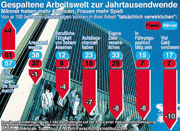People in the working world of tomorrow
People in the working world of tomorrow:
Men have more opportunities at work, women have more fun at work
At the turn of the millennium, a divided working world is emerging: working men rate their chances of promotion (23%) significantly higher than working women (8%). The same applies to above-average earning potential (17% - women: 10%) and the opportunity to work in management positions (15% - women: 7%). However, this need not be a reason for women to resign themselves: Because they feel they have work that is enjoyable (61% - men: 57%). This is the result of a representative survey of 3,000 people aged 14 and over, in which the Leisure Research Institute of British American Tobacco also asked 1,493 working women about their career aspirations and their actual situation at work.
Despite factual inequalities, additional time demands and some inconveniences, women are more willing to come to terms with the existing working conditions - if the motivation is right. "Having a job that is fun is more important for women's self-confidence than the opportunity to earn a lot of money," says Institute Director Prof Dr Horst W. Opaschowski.
There is much to suggest that women are more successful or find it easier to combine their professional and private lives. Men are quick to relinquish responsibility for family and children for the sake of professional success. Women, on the other hand, want to live a balanced life even when working and favour a balanced life concept between professional and private life, in which no area of life is simply subordinated to the other. Women are also consciously distancing themselves more from exclusively career-orientated life concepts: they consider family, friends and leisure to be just as important as earning money, professional ambitions and having fun at work. Opaschowski: "Women are signalling a new quality of life: enjoyment of work is ‚in‘, but so is the joy of creating with family, leisure and friends. Job first, then money - and then life? That no longer applies to many women."
Women are better able to deal with the increasing detachment of gainful employment from the identity of their lives. They create new identities for themselves, whereas men tend to doubt the meaning of their lives when they lose their jobs. Women live by the motto "The end of gainful employment does not mean the end of life's work." Men, on the other hand, lose their identity anchor with their job; they have to ‚work‘ on the question of meaning much more than women.
Dissatisfaction dilemma in the world of work:
Large gap between desire and reality
Companies are increasingly complaining about ‚internal resignation‘ or the ‚secret exit‘ of employees, motivation problems and feelings of frustration in the workplace. The main cause of dissatisfaction on both the employer and employee side is the large gap that exists between what employees want and the reality of the working world that companies can offer. Two out of five employees (42%) are interested in career advancement opportunities. However, not even half of them are offered them (20%). As a result, one in five employees (22%) are not motivated - they continue to work but do not really progress. As the level of education and training rises, the army of dissatisfied people in the working world of tomorrow will tend to grow.
Self-realisation" remains a legend
Everyone talks about it, many dream about it, but only a few can achieve it in their work - "self-realisation". What people are looking for are very personal opportunities for activity and affirmation at work, in particular opportunities to realise their own ideas and objectives and, of course, to have a sense of achievement where they can unfold and develop personally. However, there is a considerable gap between desire and reality. Almost three quarters of all employees (72%) are disappointed to admit that they are currently unable to fulfil themselves at work. Professor Opaschowski: "Self-realisation at work is a legend and remains just a pipe dream for most employees. Many therefore ‚secretly‘ shift their desire for self-realisation to non-work areas of life such as hobbies, sport and holidays."
On the threshold of the new millennium, work provides a livelihood, brings variety to life, opens up new opportunities for socialising and is also fun. But work as the meaning of life and a central area of identification, "what is worth living for", has become almost unattainable for most working people. For them, gainful employment is part of life, but is no longer at the centre of their lives.



